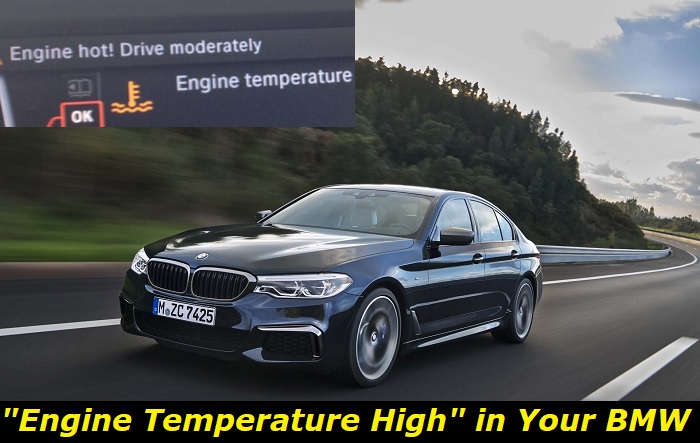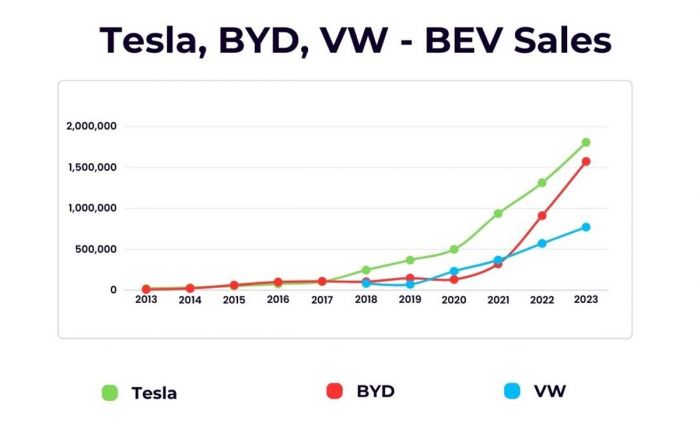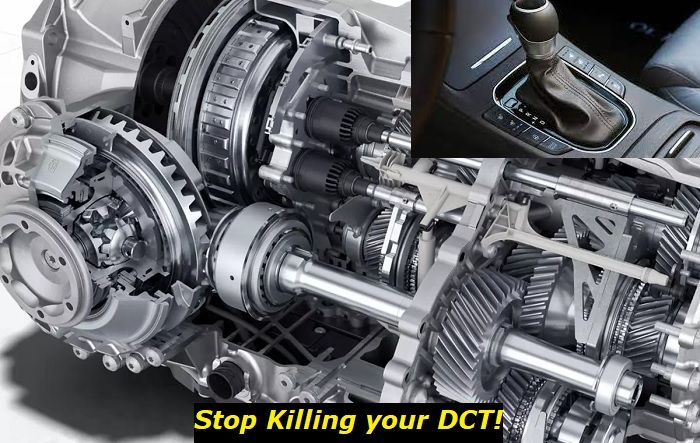Is your almost perfect BMW suddenly acting up? If you see an error message on your dashboard that reads 'Engine Temperature Too High: Drive Moderately', this article is for you. Do not worry too much because whichever model of BMW you own belongs to an elite class of the globally celebrated German machinery.
Engine temperature too high message highlights
- Common reasons:engine overheating, temperature sensor problem
- How to fix:let the engine cool down, check the sensor with the scanner
- Possible consequences:overheating can kill your engine
- Priority level:High
- Can you drive?Not recommended
- DIY repair:Possible
- Repair price range:$0-$150

Unfortunately, since BMWs do not have a temperature gauge, it can sometimes be difficult to tell whether or not the engine is overheating. However, there are specific signs associated with overheating problems in BMW models.
Four Signs that your BMW Engine Temperature is too high
Here is how you can tell your BMW engine temperature is too high:
1. Pay Attention to the Engine Sound
Does your BMW engine produce a loud, unpleasant trembling sound, especially when the air conditioner is on? If yes, then there is a high chance that the engine is overheating. It is common for the machine to rattle noisily when under extremely high temperatures.
The air conditioner (AC) sharply increases the engine temperature by placing constant energy demands on various components. You need to pay critical attention to the sound your BMW engine produces, especially when the air conditioner is turned on and after driving for several miles in hot weather.
2. Check the "Drive Moderately" Error Signal
While BMWs lack temperature gauges, these vehicle models have sophisticated computerized components designed for temperature regulation. You need to check your car's IDrive or ECU to determine whether or not the engine is overheating.
A 'drive moderately' error message will pop up in case of a heating fault. You must pull over and stop the engine as soon as possible after the warning light pops up if you don't want your engine functionality destroyed.
3. Check the Coolant Level
Not having enough coolant puts your car engine at risk of overheating problems. Where you have inexplicably low coolant levels, a leak is likely to blame. You need to carefully check for wet spots below the engine compartment to see whether your low coolant level may be due to a leak.
Check the top of your coolant lid to know the cooling system fluid level. In many vehicle brands, the cap typically features information about the specified amount and cooling fluid needed in the engine. It would be best if you only open the lid when the engine is off.
4. Check if the Cooling Fan is Functioning
Your car engine may overheat simply because the cooling fan is not working as it should. There are different reasons why a BMW cooling fan can stop functioning. A blown-up fuse or malfunctioning temperature sensors are the most likely causes of a cooling fan malfunction in your BMW.
Should I Worry that my BMW Engine Temperature is too high?
Yes. Excessive engine temperatures can result in various engine components' mechanical and functional problems. The radiator seals and hoses in your BMW engine are more likely to break if you drive while your engine is overheating. It is not advisable to ignore your drive moderately warning message. The long-term repairs will cost more than fixing the problem immediately when it appears.
The damaging effects of overheating on warped cylinder heads come with many repair costs. You may have to spend lots of cash on gasket replacement, head repair or replacement, etc. To be on the safe side, if you see the 'drive moderately' error message in your BMW, consult your dealership or a certified mechanic for professional diagnosis and repair.
Common Causes of High BMW Engine Temperature
Many conditions can make your BMW engine overheat, from thermostat cooling system failures to water pump problems.
The following are, however, the most significant causes of BMW engine overheating problems. Read on to discover why your BMW engine temperature is too high.
- Low Coolant Levels or Wrong Coolant
Every BMW engine requires a specified amount and type of coolant. Your car engine may overheat due to low coolant levels or because you applied a non-recommended coolant. You can check your vehicle manual to see the recommended level and type of coolant.
Your BMW engine may overheat because it is not receiving the right amount of coolant fluid that can keep it at the optimum temperature all the time. If your coolant level is critically low, ensure you are not suffering from a leak.
- Cooling System Failure
Cooling system failures stem from various restrictions in the cooling mechanism. These restrictions arguably make it hard for the coolant to circulate in the engine as needed. Dirt plagues and faulty thermostats are specifically notorious for cooling system failure.
Apart from debris formed on the radiator and fan area, electrical systems failure like wiring and fuse problems can also stall the cooling system of your BMW engine leading to overheating issues.
- Water Pump Problems
A BMW engine is more likely to overheat when a faulty water pump. A water pump ensures the proper flow of the coolant liquid by enhancing the correct engine temperature. Heating problems are therefore prevalent in cars with water pump problems.
- Fan Problems
Your BMW engine will overheat if the cooling fan stops functioning. A fuse problem stemming from wiring can abruptly stop the cooling fan from functioning. Besides, a faulty temperature sensor can also result in fan mishaps that eventually lead to overheating issues.
Is Your BMW Engine Temperature too high? Here is what to Do
A high engine temperature may cause worry to many car owners, considering the devastating effect a high temperature can have on various motor components.
As a BMW owner or driver, the best thing you can do to avoid this is to take your car to a licensed BMW garage to rectify this problem. Nevertheless, there are several simple things you can do on your own to address the issue before it gets worse.
Here's what you should do if you see an overheating warning in your car's IDrive:
- Number One: Stop the Engine
You are more likely to destroy your car engine if you continue driving while it has overheated. Hence, you must pull over and stop the engine immediately after seeing the 'drive moderately' signal. Because it is difficult to inspect the engine while running, stopping the machine will help you carefully check faults that may have caused the overheating.
- Number Two: Turn off the Air Conditioner
The air conditioner increases the engine temperature by heating a significant portion of the engine component. Leaving your AC on when your engine has heating problems is, therefore, not an option if you want to enhance the functionality of your machine.
- Number Three: Ventilate your Car Properly
After pulling over, you need to find a way of getting the excess heat from your engine. The best way to do this is to open the car hood. Leaving it open is beneficial for letting out the trapped hot air and allowing proper air circulation in the engine compartment.
- Number Four: Check the Coolant Type and Level
Because a low coolant level or wrong coolant type can cause a BMW engine to overheat, you have to check your coolant level. It would be best if you opened the coolant lid 30 minutes after you stopped the engine from running. The coolant lid should inform you about the suitable coolant level and type.
- Number Five: Clean the Radiator
Seeing dirt on the radiator area is prevalent, especially after driving on a non-tarmacked or dirt track for a lengthy period. Radiator dirt or debris can cause an overheating problem simply by blocking the air channel. If your radiator area appears to be corrupted by filth, splash the area with water or remove the dirt carefully by hand.
Besides trying out the above and regularly servicing your machine, you must take your vehicle to a reputable BMW garage for further diagnosis. Doing this will avoid extra damage to your precious BMW engine and the associated repair costs.
Conclusion
Driving with an overheating BMW engine is not only costly but also dangerous. An overheated engine risks engine components like radiator hoses and cylinder heads. In addition, driving with a high engine temperature can also lead to accidents, as the heating problem can interfere with the steering column.
You need to look for unpleasant sounds from the engine, low coolant levels, and a 'drive moderately' error message if you suspect your engine is overheating. Regular servicing has proved to be effective in avoiding BMW heating problems.
Failure to address heating problems in your BMW engine is more likely to result in:
- Blown head or gasket
- Melted engine components
- Damaged exhaust system
- Broken radiator seals or horses
As noted before, you should regularly service your car at an accredited BMW garage to avoid these problems. You also need to replace essential BMW engine components like the thermostat for at least 80,000 to 100,000 miles, as recommended by the manufacturer, to avoid heating problems caused by faulty engine parts.
About the authors
The CarAraC research team is composed of seasoned auto mechanics and automotive industry professionals, including individuals with advanced degrees and certifications in their field. Our team members boast prestigious credentials, reflecting their extensive knowledge and skills. These qualifications include: IMI: Institute of the Motor Industry, ASE-Certified Master Automobile Technicians; Coventry University, Graduate of MA in Automotive Journalism; Politecnico di Torino, Italy, MS Automotive Engineering; Ss. Cyril and Methodius University in Skopje, Mechanical University in Skopje; TOC Automotive College; DHA Suffa University, Department of Mechanical Engineering






Add comment